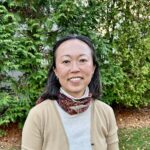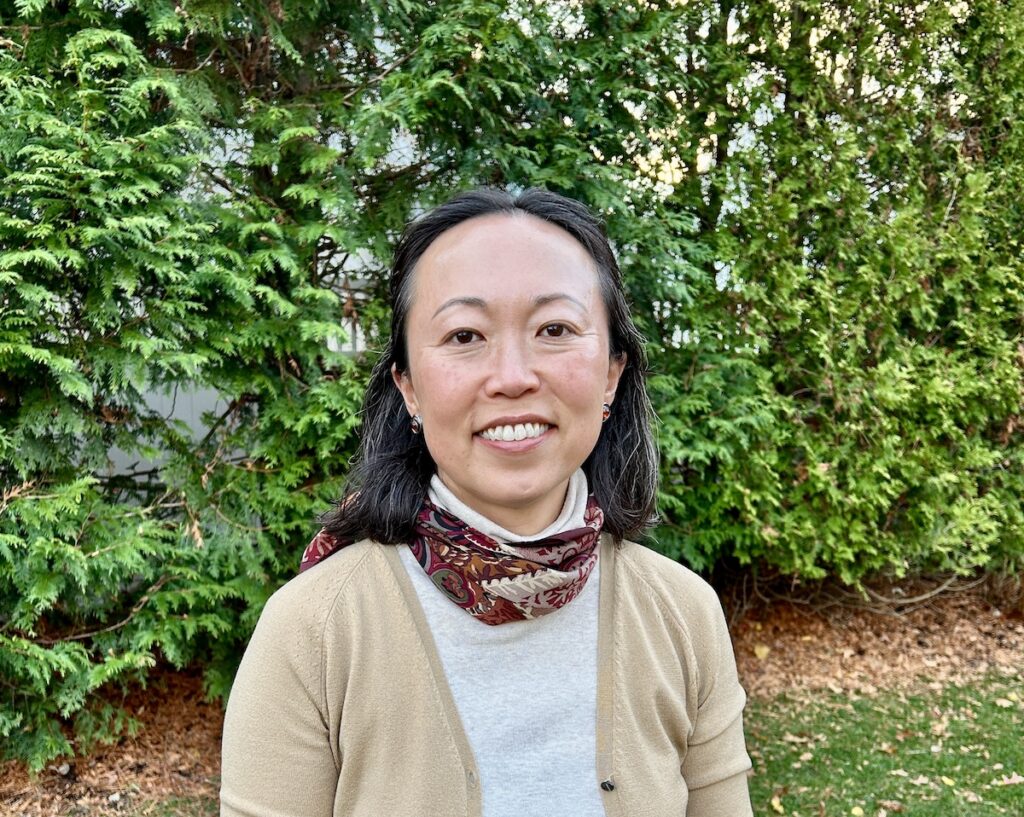
By Elissa Ely
In this rough world, there are those who turn to all sides with grievance and rage. But there are also those who turn with care and gentleness—and if they happen to turn with medical expertise as well, the rough world is fortunate. They are treasures. Here is one.
Gi Yoon Huang, MD—co-director of the Belmont Celebrates Asian American Pacific Islander Heritage group, Town Meeting member, and member of multiple Belmont committees—was born in South Korea. Her parents had moved to Virginia from their impoverished, war-battered country (“it was their American dream”), but her mother returned briefly back to give birth.
Immigrant life in the United States was challenging, and Gi was raised as an only child in South Korea by her maternal grandmother. She remembers sitting in streams of sunlight next to this gentle, calm being, looking together through a pile of beans, separating out the pebbles from the dinner. Companionable love was the first constant of her life. “In medicine, you see heartache and joy,” she says, “and I was so well-grounded by a grandmother who doted on me.”
When she was six, Gi rmoved to Virginia to live with her father. Her gentle, calm grandmother could not follow her, but lived to see Gi become a physician, and also lived to meet her two great-grandchildren when they visited Korea, before she declined during the first COVID-19 wave.
Gi’s father, at 85, is still a designer, builder, and woodworker. His passion, though—his great involvement—was advocating in the US for Korean recognition and appreciation. “He was seized by a desire to help Koreans,” Gi says, which led him to an unpaid second career. He created the Korean Heritage Foundation, and among other projects, brought exhibitions to the Smithsonian and the Kennedy Center. Proximity to his untiring volunteerism was the second constant in Gi’s life.
Speaking no English, she struggled during her first few years to know what others were saying. It would have been natural to wander without direction. But when she was 12, Gi discovered Christianity (her grandmother had been Buddhist), and this has been the third, perhaps most imperative, constant of her life. “I ended up finding faith,” she says. “It was a saving grace. It gave me life guidance.”
When she went to medical school, her intention was to work as a medical missionary, “helping the most needy of the world in the most practical way.” General surgery seemed the relevant specialty, and she had inherited “some hand-crafty genes.” But surgical training is especially grueling. “I was getting mean and snippy, a wilted flower growing more wilted. I couldn’t serve people, being nasty.”
Ophthalmology uses hand-crafty genes, too, but differently. “The eye is intricate, beautiful. You’re not destroying things, you’re doing repair. I can’t watch blood and gore in a movie, but an eye surgery is controlled.”
Gi fell in love with pediatric ophthalmology, where effects can last a lifetime. Through the Boston Medical Center, she works with children from group homes and foster care, infants to teens, often long-term, and often underinsured or uninsured.
The diagnoses she specializes in cause visual impairments but also psychological ones; no child wants to gaze at their peers out of eyes that cross or wander. “Hey, how are people treating you?” she’ll ask a young patient, and then take all the time an answer requires, even when other young patients are waiting. It’s missionary work.
As often happens, medical residency and fellowship training years were peripatetic, and Gi estimates she moved annually through most of them. But 12 years ago, she and her family arrived in Belmont, where roots went down and into the community. “It’s not only a dwelling,” she says. “This is my home. I embrace the idea of getting involved.”
She was pushing a stroller one day, her toddler buckled in and her newborn tucked into a Baby Bjorn carrier when she passed the green space in Belmont Center. She’d heard that part of it was slated to become a cut-through business driveway, a renovation that would have destroyed a place of congregation. “Before this, I’d had no political interest other than voting—being in medicine, I had no bandwidth,” she explains.
Ignited, she decided to become a Town Meeting member (the children she brought to meetings with her joined as unelected members), and realized she loved attending (their perspective was less clear). “I heard all opinions, and got to know people I wouldn’t know otherwise. It was like the Congress of Belmont.” Today, the green space remains green, and there is visual proof. “Ten years later, I see my daughter eating pizza and ice cream there.”
Recruitment into other committees followed: the Superintendent Search Committee, Police Chief Search Committee, ‘Yes to Belmont’ Committee for middle and high school building budget overrides, Safe Routes to School. “I so appreciate the number of people who volunteer with no direct return,” Gi says. “Belmont is a place run by volunteers, and it’s beautiful.”
Belmont Celebrates Asian-American Pacific Islander Heritage (BCAH) month started during the pandemic, when anti-Asian rhetoric was ballooning. In 2021, 10% of Belmont Asian American middle and high school students reported making a suicide plan. One Belmont school child spat at another. Intervention was imperative, and Gi became co-chair of the group.
It’s composed mostly of other parents. On the surface, the month they plan in May is filled with family activities: traditional dances, tae kwon do, raffles, speakers. There’s an essay contest, and courageous children can play a chess Grandmaster in simultaneous matches (he never loses).
Under the surface, though, it’s filled with education. More than 40% of Americans can’t name a famous Asian-American citizen. In addition to their May event, BCAH has donated hundreds of books, mostly biographies, to Belmont schools, not only to increase cultural recognition, but also to acknowledge, for Asian-American children, biases and mistreatment. “The information is given to our youth,” Gi explains, “so they know there’s a whole group that walked before them and also experienced these things.”
Meanwhile, there are patients to care for gently, and her own family where she wishes to be present in the quiet ways her grandmother was present for her. Immersion into volunteering has required balance. “The magic words are part-time work,” she says.
The other magic word is faith. “If I’m able to have a solid sense of hope that things will get better, I can delve fully into the grief of the current situation without going into despair. I’m in it, now. Each day, I’m trying to be faithful to what is good and right.”
Elissa Ely is a community psychiatrist.



Sorry, the comment form is closed at this time.